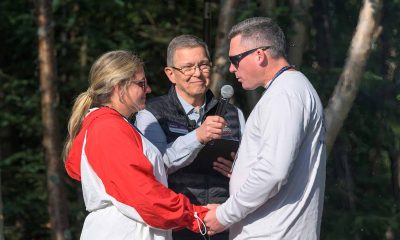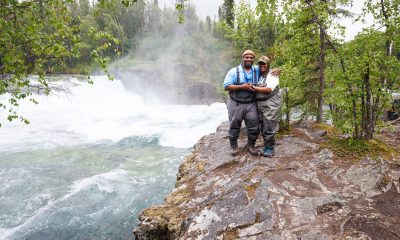Spiritual care like that found through Operation Heal Our Patriots is needed to help America's veterans heal from post-traumatic stress disorder
When a soldier is injured in battle, his wounds require careful attention and need time to heal. If someone has lost a leg, been shot, or badly burned, we acknowledge a process of both healing and grieving.
While they may or may not have obvious physical injuries, soldiers with post-traumatic stress disorder (PTSD) also have been deeply wounded. And we must acknowledge a similar type of healing and grieving process for them, says James Fisher, chaplain for Operation Heal Our Patriots, a Samaritan’s Purse ministry to wounded military personnel and their spouses.
“Why would mental trauma heal faster?” he asks. Healing takes time.
Deployments to the wars in Afghanistan and Iraq have been especially difficult on the mental health of America’s troops. The high incidence of combat exposure these men and women have endured is likely to blame, at least in part. The majority of soldiers in the Operation Heal Our Patriots program this past year suffer from PTSD, often on top of other traumatic injuries.
“Any time you’re in direct combat, it’s a horrific, scary circumstance,” says Fisher, who himself served in Afghanistan and the first Gulf War as a Navy chaplain.
Soldiers may have seen brothers in arms die next to them, he says. They struggle with guilt and residual fear. Our veterans, more than most, have faced humanity’s mortality and depravity.
Many of them, Fisher says, are asking, “Where was God in all this?”
Responding to the Needs of America’s Patriots
Suicide, domestic violence, alcoholism, and divorce are all too common among those suffering with PTSD. Nevertheless, with care, counseling, and community involvement, issues can be dealt with over time and usually resolved, Fisher says.
But finding good, personal care sometimes can be difficult. The military and Veterans Administration systems are doing the best they can, but they are overloaded, Fisher says.
“The best resource for healing is the church,” he says. The church is uniquely equipped to deal with spiritual issues and point men and women to the Great Physician, Jesus Christ.
 There’s nothing veterans from Iraq and Afghanistan and their spouses need more than a personal relationship with the Lord. That’s why during their time at Samaritan Lodge Alaska in Port Alsworth, couples hear the good news of Jesus Christ through daily devotions, a closing worship service, and as part of the marriage resiliency classes. Samaritan’s Purse is committed to long-term follow-up and works to connect all willing couples in the program with a local church.
There’s nothing veterans from Iraq and Afghanistan and their spouses need more than a personal relationship with the Lord. That’s why during their time at Samaritan Lodge Alaska in Port Alsworth, couples hear the good news of Jesus Christ through daily devotions, a closing worship service, and as part of the marriage resiliency classes. Samaritan’s Purse is committed to long-term follow-up and works to connect all willing couples in the program with a local church.
Fisher encourages every pastor in America to do some research on PTSD as well as traumatic brain injury (TBI).
“There are a lot of veterans in the pews who need a word of healing and reconciliation. You can address these issues. Pastors and churches can become sources of healing for these guys,” Fisher urges.
For some, the calling needs to go beyond church walls. Fisher asks fellow believers with good counseling skills to consider volunteering their time at a VFW or American Legion hall.
The needs are pressing—will the body of Christ respond?








